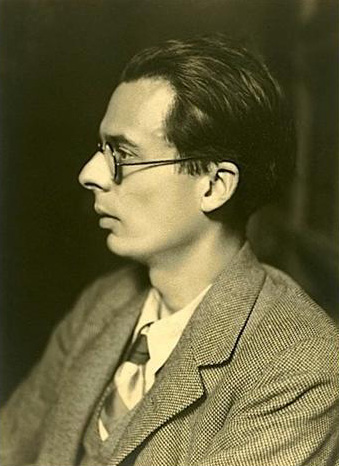FIFTH PHILOSOPHER’S SONG
By:
March 8, 2023
A (pro- or anti-) science-, mathematics-, technology-, space-, apocalypse-, dehumanization-, disenchantment-, and/or future-oriented poem published during sf’s emergent Radium Age (c. 1900–1935). Research and selection by Joshua Glenn.

A million million spermatozoa,
All of them alive:
Out of their cataclysm but one poor Noah
Dare hope to survive.
And among that billion minus one
Might have chanced to be
Shakespeare, another Newton, a new
Donne —
But the One was Me.
Shame to have ousted your betters thus,
Taking ark while the others remained
outside!
Better for all of us, froward Homunculus,
If you’d quietly died!
— From Leda (1920)
Jerome Mecker’s Aldous Huxley, from Poet to Mystic offers the following insights:
The Philosophers’ Songs, taken together, form a self-parodying series. We are invited to imagine the befuddled first, second, fifth, and ninth philosophers (we don’t know what’s become of the othere) publicly “singing” bleak laments about their collective inability to form adequate explanatory hypotheses about how things are.
In a 21 July 1918 letter to Julian Huxley, Aldous explains that these “songs” were originally intended to form a part of the poem “Soles Occidere et Redire Possunt” (“Suns Can Set, and Suns Can Rise Again”), which would become the final poem in Leda. The letter refers sarcastically to “The Fifth Philosopher’s Song” as a “most lovely” little poem “which comes into it [‘Soles’] at one point.” Before quoting the as yet untitled “Fifth Philosopher’s Song” in its entirety, Aldous tells Julian it is intended to be “quite Tennysonian, both in respect to its perfection of form and in its recognition, so highly acclaimed by Grand Pater [T. H. Huxley] in the late Poet Laureate, of the truths of Science.” The poems are, that is to say, a satire of the sort of consoling lyrics that Tennyson gives us in “In Memoriam A.H.H.” (1850), which explores the random cruelty of Nature seen from the conflicting perspectives of materialist science and declining Christian faith in the Victorian Era, and which suggests that everything happens according to a divinely appointed program. In Memoriam‘s progression from crisis to resolution affirms that the knottiest philosophical problems can still be solved; it attests to the universe’s rational design.
The fifth philosopher finds it impossible to perceive a grand design. Either ignorant or a fraud, Tennyson reduced competitive existence to a level the human mind could comprehend. If the world operated in deference to Tennyson’s unscientific attribution of a “secret meaning” to Nature’s “deeds,” sperm destined to produce weak-minded singing philosophers would give vaginal preference to the next Newton or another Donne; the Victorian poet’s “larger hope” would be served. […] The modern philosopher’s sperm count, like the use of the copulative metaphor in “Leda,” discredits Victorian fastidiousness as another kind of “perfection of form” false to life. When the fifth philosopher fears that Nature, in allowing him to be born, made a mistake, Huxley expresses contempt for the pacifying conclusion Tennyson resorted to in poem CXXVIII: namely, “That all, as in some piece of art, / Is toil cooperant to an end.”
RADIUM AGE PROTO-SF POETRY: Stephen Spender’s THE PYLONS | George Sterling’s THE TESTIMONY OF THE SUNS | Archibald MacLeish’s EINSTEIN | Thomas Thornely’s THE ATOM | C.S. Lewis’s DYMER | Stephen Vincent Benét’s METROPOLITAN NIGHTMARE | Robert Frost’s FIRE AND ICE | Aldous Huxley’s FIFTH PHILOSOPHER’S SONG | Sara Teasdale’s “THERE WILL COME SOFT RAINS” | Edith Södergran’s ON FOOT I HAD TO… | Robert Graves’s WELSH INCIDENT | Nancy Cunard’s ZEPPELINS | D.H. Lawrence’s WELLSIAN FUTURES | & many more.
